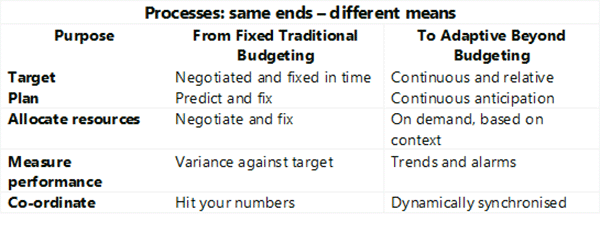 It is difficult to think of another business process that is as universally detested as annual budgeting.
It is difficult to think of another business process that is as universally detested as annual budgeting.
The list of complaints will be familiar to anyone who has run a budget process or has been subjected to one…, and that probably means everyone reading this article.
1. It consumes an enormous amount of time and effort…often the time of those that have the least to spare. Indeed, the Hackett Group reckons that up to 10% of management time is spent on the annual budget, which would make it the single most expensive business process.
2. It takes so long that it is out of date and of limited value by the time it is complete. A survey by Business Finance magazine found that two-thirds of budgets were out of date between 4 and 6 months into the year…so most companies are flying blind most of the time.
3. Budgets are inflexible by design. Once people realise they are out of date, it is difficult to change them. This is partly because of the level of detail at which they are produced and mainly because they have become the anchor point for so many management processes – from incentives to performance measures to decision-making rights – all of which are interrelated, meaning that a change to one aspect will impact many other peoples ‘rights’ and obligations.
4. Budgets drive dysfunctional ‘gaming’ behaviour. It is always easier to negotiate a lower target than it is to improve performance, so unsurprisingly, people devote a lot of effort to attempting to manage the budget process. As a result, revenue and profit are subs optimised, costs artificially inflated, and political behaviour is rewarded.
Budgeting has been around for nearly a century, but it is still with us, despite its well-known failings.
Why?
My guess is the reason is that most people are not aware that there is an alternative to traditional budgeting. Most of the ones that have been touted over the last few decades – Zero Based Budgeting and ‘Better Budgeting’ – amount to no more than doing the same things in a slightly different way. In my view, they do the wrong things slightly righter.
The best alternative – Beyond Budgeting – has also been around for some time. Still, it has failed to have the impact that it should have because it has not been properly understood or it has been actively misrepresented.
The name ‘Beyond Budgeting’ is an accurate description of what ‘it’ is, but unfortunately, in some people’s minds, it conjures up a nihilistic vision of chaos. I believe these fears are misplaced. Control (in the non-pejorative sense of the word) is key to Beyond Budgeting – it is simply exercised in a different way, using different tools. The ends are the same, but the means differ.
This is summed up in the following table:

The Beyond Budgeting ideas have matured over the last decade or so, and there are now many examples of companies that have applied these ideas and seen their business performance improve dramatically. As a result, I think it is time to correct false impressions of what BB is and why it is successful. To help relaunch these ideas, I have written a short book based on my experience of working with the concepts since they first burst onto the scene in 1998.
Subscribe to
FP&A Trends Digest

We will regularly update you on the latest trends and developments in FP&A. Take the opportunity to have articles written by finance thought leaders delivered directly to your inbox; watch compelling webinars; connect with like-minded professionals; and become a part of our global community.

